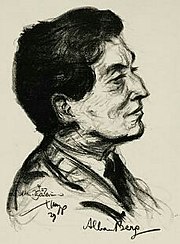Loading AI tools
From Wikipedia, the free encyclopedia
The Seven Early Songs (Sieben frühe Lieder) (c. 1905 – 1908), are early compositions of Alban Berg, written while he was under the tutelage of Arnold Schoenberg. They are an interesting synthesis combining Berg's heritage of pre-Schoenberg song writing with the rigour and undeniable influence of Schoenberg. The writing very much carries with it the heritage of Richard Strauss (although the influences of a number of other composers can be discerned – Robert Schumann, Gustav Mahler, and Hugo Wolf for example, as well as Claude Debussy's harmonic palette in evidence in "Nacht"), through the expansiveness of gesture and 'opening of new vistas,' and that of Richard Wagner. The songs were first written for a medium voice and piano;[1] the composer himself revised them in 1928 for high voice and orchestra.[2]
| Sieben frühe Lieder Seven Early Songs | |
|---|---|
| Lieder by Alban Berg | |
 The composer, sketched by Emil Stumpp in 1927 | |
| Text | poems by Carl Hauptmann, Nikolaus Lenau, Theodor Storm, Rainer Maria Rilke, Johannes Schlaf, Otto Erich Hartleben, Paul Hohenberg |
| Language | German |
| Composed | 1905–08 |
| Scoring |
|
The seven songs are:[3]
The orchestral version is scored for high voice (soprano) and:[2]
Seamless Wikipedia browsing. On steroids.
Every time you click a link to Wikipedia, Wiktionary or Wikiquote in your browser's search results, it will show the modern Wikiwand interface.
Wikiwand extension is a five stars, simple, with minimum permission required to keep your browsing private, safe and transparent.